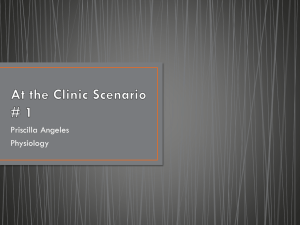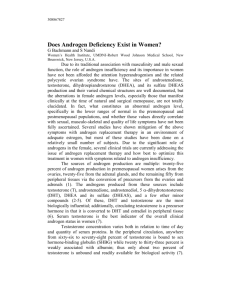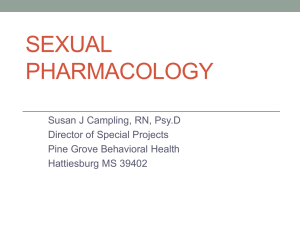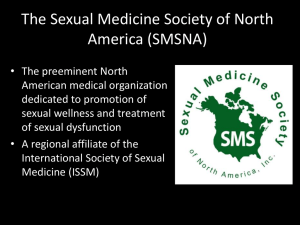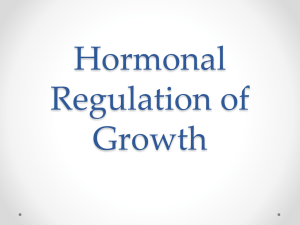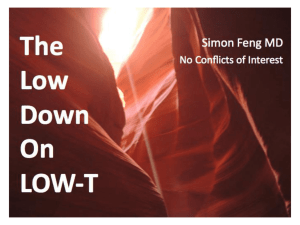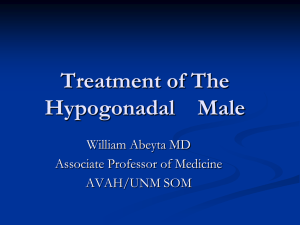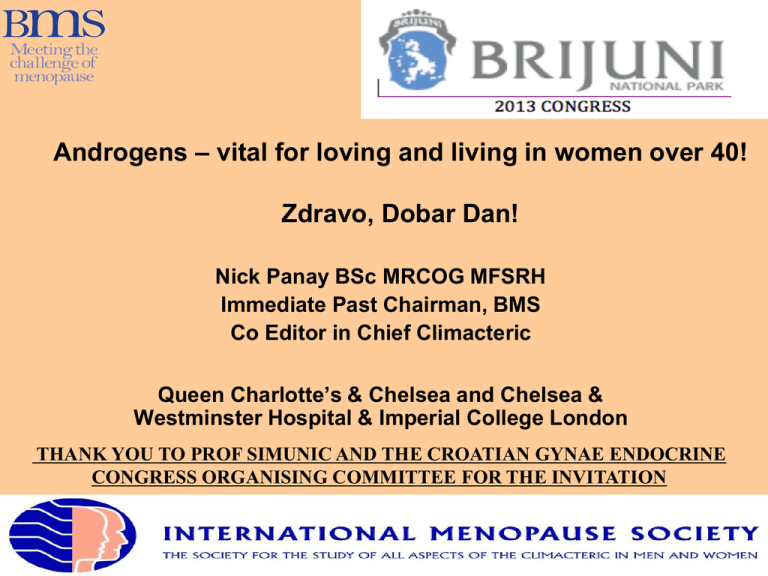
Androgens – vital for loving and living in women over 40!
Zdravo, Dobar Dan!
Nick Panay BSc MRCOG MFSRH
Immediate Past Chairman, BMS
Co Editor in Chief Climacteric
Queen Charlotte’s & Chelsea and Chelsea &
Westminster Hospital & Imperial College London
THANK YOU TO PROF SIMUNIC AND THE CROATIAN GYNAE ENDOCRINE
CONGRESS ORGANISING COMMITTEE FOR THE INVITATION
Androgens – vital for loving and living in
women over 40!
• Androgen Physiology
Agenda
• Androgen levels and sexual desire – who should we treat?
• Pragmatic Approach to Managing HSDD (distressing low sexual
desire)
• Treatment Options
• Safety
• Advisory Bodies
• Take Home Messages
Physiology of Endogenous
Androgens
The Role of Androgens in Female
Sexual Function
• Sex hormones (E, T, P) prime the CNS to respond to
sexual stimulation1-2
• Androgen receptors exist in a number of CNS areas
(hypothalamus, cortical & limbic) and are targeted in
various ways by androgens
– Via the systemic circulation
– Directly from the brain (steroidogenic organ)
– By aromatisation to estrogen
1.Meston et al Arch Gen Psych 2000; 2.Studd & Panay Climacteric 2004
The Role of Androgens in Female
Sexual Function
• Androgens produced mainly by ovaries and adrenals
under stimulation of LH and ACTH
• Major androgens include DHEAS, DHEA,
androstenedione (A) and testosterone (T)
• T is the most potent androgen
• DHEAS, DHEA, A are androgenic precursors to
testosterone
• T is converted to DHT and Estradiol
The Role of Androgens in Female Sexual
Function
•
Healthy young women produce approx 100 – 400 mcg/day
- 3-4 times more testosterone than oestrogen
•
Testosterone modulates sexual desire, arousal and orgasm
•
Testosterone levels also affect other aspects of female
physiology
• General well- being
• Energy
• Mood
Burger HG. Fertil Steril 2002;77, No 4, Suppl 4:S3-S5
Mazer NA. Int J Fertil 2002;47(2):77-86
Labrie F, et al. Endocr Rev. 2003;24:152-182
• Bone physiology
• Muscle mass
• Hot flushes
Who should we treat? - is there
correlation between testosterone levels and desire?
40
20
49% reduction
from 18-24yrs
to 65-75yrs
0
0
20
40
Free Testosterone, pmol/L
60
60
Free testosterone levels decline with age
20
30
40
50
60
age, years
70
80
18-24 25-34 35-44 45-54 55-64 65-75
age group, years
n= 595 women
Davison SL et al. (2005) Journal of Clinical Endocrinology & Metabolism; 90 (7): 3847-3853
Androgens – vital for loving and living in
women over 40!
Other causes of androgen insufficiency
• Surgical menopause
• Early ovarian impairment
• Adrenal insufficiency
• Iatrogenic Treatments (oral estrogens, anti androgens,
COCs, GnRHa, corticosteroids)
1. Nappi et al Men Int 2010; 2. Maclaran K & Panay N Women’s Health 2011
Should we reserve androgen replacement for
those with proven low systemic T levels?
Correlation of sexual desire with androgen levels is controversial!
Studies showing correlation with androgen levels….
• Higher levels of sexual desire at menopause transition in
women with higher T levels1
• 121 women with HSDD v 124 controls – DHEAS and other
androgenic precursor levels significantly lower2
• Lower circulating levels of E2 and DHEAS in highly
symptomatic early postmenopausal women with HSDD3
1. Woods et al Seattle Midlife Women’s Health Study J Women’s Health 2010 2. Basson et al Menopause 2010
3. Nappi et al Maturitas 2010
Should we reserve androgen replacement for
those with proven low systemic T levels?
But, confounding variables make direct correlation of T with
HSDD difficult
– Intensity of sexual symptoms is affected by
• estrogen deficiency symptoms (esp urogenital atrophy)
• predominantly mood related symptoms
• poor social/environmental factors: work/relationship
related stress, financial concerns etc
• restrictive cultural practices1
1. Nappi et al Maturitas 2010
Should we reserve androgen replacement for
those with proven low systemic T levels?
Brain intracrinology
• May be more critical to female sexual desire and
function than peripheral androgens1-2
• Androgenic metabolites (either within the cells of the target
tissue or released into the plasma) are produced locally
from precursors such as DHEA
• This could be main explanation for complex correlation
between circulating testosterone levels and sexual desire
1. Labrie et al Endocr Rev 2003; 2.Brotto et al J Sex Med 2010
Should we reserve androgen replacement for
those with proven low systemic T levels?
Inter-individual variability
• Every woman has her own threshold of tissue
responsiveness to hormonal variations
depending on several factors e.g. genetic,
biological, psychological1
1. Nappi at al MI 2010
Impact of POI on Sexual Function
• “The earlier the menopause, the more severe
and complex the impact on sexuality is”
• “Very few studies (three)2-4 have specifically
investigated the sexual function of women with
POI”
1. Graziottin A Ann N Y Acad Sci. 2010; 2. Kalantaridou et al Fertil Steril 2006; 3. van der Stege
Menopause 2008; 4. de Almeida Menopause 2011
www.poiregistry.net
Database Opportunities
1)POI presentation
2)Impact of Interventions
e.g. HRT v COCP
3)Role of Biomarkers e.g. AMH
4)Bio-bank for Genetic Studies
Premature Ovarian Insufficiency
Prevalence of FSD
• HSDD was reported in 64% in our POI
cohort (> 50% iatrogenic)
– Singer Mann Hunter Pitkin Panay Climacteric 2011
• Impact of androgens on HSDD in women
with spontaneous POI needs urgent study
– Maclaran K, Panay N Women’s Health 2011
Patient concerns
%
0
10
20
30
40
50
60
70
80
Fertility
Responsiveness to sex
Long-term use of HRT
Fatigue
Outlook on Life
Confidence
Body Image
Poor Memory
Sexual Partner
Weight Gain
Sel-image
Stress
Overall Health
Joint Pain
Headaches
Skin problems
Immediate family
Friends
Managing symptoms
Future Partner
Employment
Singer D, Mann E, Hunter M, Pitkin J, Panay N, Climacteric 2011
Most problematic concern
Particular concern
Pragmatic Approach to Managing
HSDD
Pragmatic Approach to Managing HSDD
– Validated questionnaires – used mainly in studies e.g. FSFI or
PFSF – but, you need to ask the right questions to get the right
answers!
– Multidisciplinary approach with psycho sexual counsellor /
psychologist to explore relationship / psychological issues
– History – medical problems e.g. thyroid, diabetes, SSRIs
– Examination – atrophic changes, prolapse, PID, endometriosis etc.
– Investigations for concomitant conditions e.g. TFTs, prolactin
1. Nappi et al Men Int 2010; 2. Maclaran K & Panay N Women’s Health 2011
Pragmatic Approach to Managing HSDD
Androgen Insufficiency Syndrome & HSDD
diagnosis is based on symptoms, not androgen
levels1-2
• Possible Symptoms
– Low libido, sexual receptivity, pleasure, persistent inexplicable
fatigue, blunted motivation, reduced sense of wellbeing
– Reduced pubic hair, bone mass, muscle mass, reduced
cognition, low mood, poor QOL, VMS, insomnia, headaches
1. Nappi et al Men Int 2010; 2. Maclaran K & Panay N Women’s Health 2011
Pragmatic Approach to Managing HSDD
Should we measure T levels? – there are
problems……1
• Lack of consensus on “normal” lower limit for T / FT
• Difficulties with assay sensitivity at lower levels
• Free T assays often not available: need to calculate FAI
Testosterone x 100 / SHBG ( FAI < 6.5% upper limit )
• Tertiary Centre: Baseline and treatment levels at 2 – 3
months with TD testosterone, 5 – 6 months with implants
1. Maclaran K & Panay N Women’s Health 2011
Treatment Options
Treatment Options
15th Jan 2007
West
Androgenic Options
•
•
•
•
•
•
•
•
Oral Methytestosterone – Liver Effects
Injections – High dose / androgenic / painful IM
DHEA (po / pv) – More data, phase III trials ongoing
Tibolone – Weakly androgenic 2 RCTs show benefit
Implants? – Difficult to access; not for primary care
Transdermal patches – for discussion
Gel – for discussion
Pill-Plus - (Androgen Restored Contraception) – Phase III
• Is testosterone Pink Viagra!?
Testosterone Patches - where are we now after 10
years of research?
2012/3
Intrinsa license withdrawn by Warner Chilcott – profitability decision!
Product recently bought by HFA, marketed at £395 per month!
2013
5 year “Libigel” safety data awaiting analysis >7000 women years
Indefinite testosterone implant supply “secured” by pharmarama
Maclaran K, Panay N. Managing low sexual desire in women. Women’s Health (Lond Engl) 2011;7:571-81.
Maclaran K, Panay N. The safety of postmenopausal testosterone therapy. Women’s Health (Lond Engl) 2012;8:263-75.
Are gels a realistic option?
• Testim gel / Testogel / Tostran
• Off Label in women but useful!
• Pea sized blob (0.5-1.0ml) to abdomen daily (1 week/tube
or sachet)
• 1 pump every 2/3 days (Tostran)
• FAI < 7.0 (physiological female upper limit – no beards!)
Still awaiting analysis!
• Large 5 year US study (BLISS) of testosterone gel (Libigel)
on CV and Breast Cancer risks1
• >2800 women recruited
• No excess risk of CVD / Breast Cancer otherwise study
would have been stopped by DMB but database locked
with no funds remaining for analysis!
• No androgen preparations licensed by FDA to date
1.White et al Am Heart Journal Jan 2012
Pill-Plus - (Androgen Restored Contraception)
Addition of DHEA to EE/Progestogen pills
Six prospective, randomized controlled (placebo or
active) Phase II clinical studies of the Pill-Plus
have been completed in 355 subjects.
Increase frequency of sexual activity, arousal,
responsiveness to partner, genital sensations and
vaginal lubrication.
Improvements also in quality of life scores. No
significant androgenic effects were noted.
Bio Sante Press Release 2012
“Compounded Bio-identical Hormones”
US Senate is drafting a bill on BI hormones for 2013
“NAMS members are concerned about pharmacy compounders
who operate as manufacturers without following Good
Manufacturing Practices”
Safety
• AEs
Safety Issues
– Few AEs (e.g. acne, hair growth, scalp hair loss, voice
deepening etc) if physiological doses used
• Endometrium
– Endometrium atrophic with unopposed T usage
• Breast
– Not proliferative on epithelial cells : short term reassuring,
long term clinical data required
Maclaran K Panay N Women’s Health 2012
Cardiovascular effects of androgens
• High dose non oral or oral testosterone has been associated with
some adverse CV markers
(increased visceral fat deposition, decreased HDL)
• Few data have investigated the effect of physiological
replacement with transdermal preparations
• Recent RCTs using TTP for reduced libido noted no short term (up
to 1 year) increased risk of CVD but did not include hard clinical
outcomes or sensitive risk markers.
1van
Kesteren, 1997
Safety and tolerability of testosterone patch therapy for up to 4 years –
IM 1 & 2 trials with open label extension
976 patients, 1092 patient years of exposure to 300mcg
TTP
No significant effect on:
• BP, TGs, Chol, LPs, IR, LFTs
• No Excess of AEs or SAEs
Breast Cancer – consistent with age-appropriate
expected rates 3 invasive breast cancers observed
Nachtigall et al Gyne Endocrinology 2011
Investigating the Cardiovascular effects of the testosterone patch
Maclaran K, Panay N, Stevenson J, Collins P
• Aims:
To validate a protocol designed to determine the effects of
postmenopausal transdermal testosterone with HRT on:
– Cardiovascular system by assessing insulin resistance, endothelial
function and arterial compliance
– Libido by assessing sexual functioning.
• Hypotheses
– Transdermal testosterone, in conjunction with HRT, will not have any
adverse effects on insulin resistance and vascular endothelial function
in postmenopausal women.
– Transdermal testosterone significantly improves sexuality
and psychological well-being in postmenopausal women.
Summary of Study
• Significant increases in total testosterone and
free androgen index
• Significant increase in sexual desire as measured
by B-PFSF
• Significant reduction in hip circumference
• No change in key cardiovascular risk markers
– arterial stiffness (Augmentation index (AIx))
– endothelial function Reactive Hyperemia Index (RHI) by Peripheral
Arterial Tonometry (PAT),
– insulin resistance (Homa IR)
Advisory Bodies
IMS Recommendations 2013:
Testosterone Susan Davis
Androgenic side effects with testosterone therapy are dose
related and avoidable.
There is no evidence from large placebo controlled RCTs that
transdermal testosterone in appropriate doses for women
results in adverse metabolic or endometrial effects
Alternative HRT – Husband replacement therapy!
Take Home Messages
Androgens – vital for loving and living?
• Androgens physiologically modulate sexual
“responsiveness” of the CNS
• Testosterone levels decline with age and particularly
after surgical menopause
• Controversy continues regarding the precise correlation
of low androgen levels with low sexual desire in women
• Low sexual desire is a key symptom of both surgical &
natural menopause if enquired about
Androgens – vital for loving and
living?
• Evidence for efficacy and safety of transdermal
testosterone in menopausal women
• Transdermal testosterone no longer licensed in Europe
for HSDD in surgical menopause but can still be
prescribed “off label” by experts
• We urgently need licensed options to achieve
appropriate prescribing, especially in primary care
Androgens – vital for loving and
living?
“There is no doubt that endogenous
androgens are vital for loving and living”
“Every woman should be given the
opportunity to use exogenous
androgens, if clinically indicated”
www.nickpanay.com
HVALA! Thank you for your attention and your invitation
to your beautiful country!
www.nickpanay.com
nickpanay@msn.com

